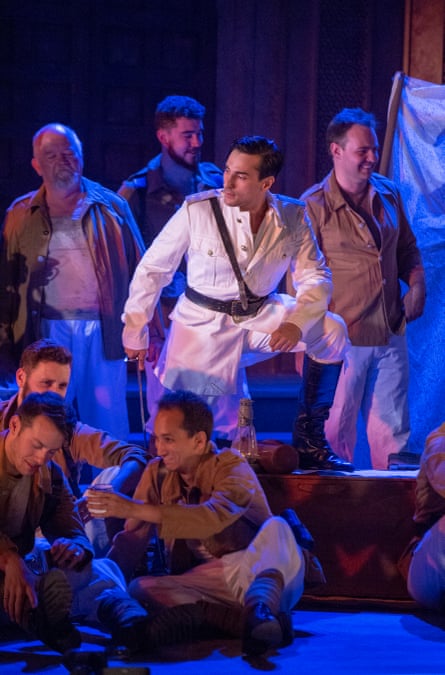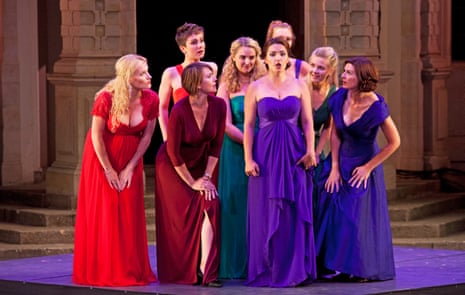Opera galas rarely merit reviews; all those artists and works can read as dull inventory if you weren’t there. The inaugural concert of Swap’ra, involving some 150 singers, conductors, directors, stage managers and orchestral players – all women; picture it – was a different matter, and formidably stylish too. The chance to witness Amanda Roocroft as a nostalgic Madame Larina from Tchaikovsky’s Eugene Onegin, or Catherine Wyn-Rogers and Anne Sophie Duprels, breaking our hearts in Puccini’s Suor Angelica, or Jennifer Johnston and Lee Bisset spinning their unwinding dreams in Britten’s The Rape of Lucretia gives you an idea of the quality.
This new campaign (the full title is: Supporting Women and Parents in Opera) is a rallying cry to the opera industry to address gender disparity and to think laterally about how to give better support to singer-parents or carers (men too). Set up nine months ago by singers Anna Patalong, Madeleine Pierard, Kitty Whately and directors Sophie Gilpin and Ella Marchment, this is as thoughtful a pressure group as you could wish. Aware that issues of equality are at last being addressed, it’s giving a spirited push to speed up that change. A network, some bursaries, creche facilities (many singers find themselves paying for both coaching and childcare as they return to work), proper advance notice of when they are required for rehearsals: these are not frightening demands.
The gala, introduced by Fiona Shaw, featured 17 scenes, directed by 10 different women and conducted by Jessica Cottis, Alice Farnham, Susannah Wapshott and Sonia Ben-Santamaria. I’ll spare you the entire list, but the programme was perceptively devised, with recent music by Elena Langer, Roxanna Panufnik and Josephine Stephenson added to the mix. Among the co-founders, Madeleine Pierard as Bellini’s conflicted heroine Norma and Kitty Whately as a sexy Nerone in Monteverdi’s Pur ti miro shone. Perhaps the most delicious, effervescent scene of the evening was Anna Patalong leading a small and perfectly formed chorus as Giannetta in Donizetti’s L’elisir d’amore. Swap’ra was her idea, though she didn’t shout about it.

Patalong was a memorable Tatyana two years ago in Dorset Opera’s Eugene Onegin. Last year she sang Marguerite there in Gounod’s Faust. No doubt many Swap’ra participants have benefited from the singular experience this tiny but vigorous company offers. An unstuffy summer camp rather than full-blown opera festival founded in 1974, Dorset Opera has established a reputation for staging rarities. This year, in rep with La bohème, the company gave the UK premiere of Massenet’s Le Cid (1885), about the medieval Castilian warrior hero.
Frequently performed after its Paris premiere, the opera was shunted aside for no obvious reason after the first world war. Perhaps the taste for a story based on a gratuitous honour killing had soured, though its source material – Corneille’s 1637 tragicomedy – is impeccable, and many an opera plot is far more mawkish. Massenet’s score, which has a couple of familiar standalone arias and many grand choruses and ensembles, is a gorgeously vivid affair, saturated with emotion and without a speck of subtlety.

Despite the music’s ceaseless fervour, the first two acts have saggy moments, but the last two acts roar by. It’s certainly worth doing, with challenging roles for Rodrigue (El Cid) and his lover, Chimène, taken with punch and intensity by Leonardo Capalbo and Lee Bisset. Paul Gay’s Don Diègue stood out among the well-taken supporting roles. The company’s music director, Jeremy Carnall, steered the performance with engaging gusto. Christopher Cowell’s production, designed by Steve Howell and updated to around the 1890s, caught the spirit of French operatic grandeur without fuss.
The entire festival happens from scratch within 17 days, the two operas rehearsed concurrently in the week leading up to opening night. Dorset Opera has no public funding, and relies on box office, patrons, friends and charitable trusts. It gives full bursaries to young participants from the locality. Training and masterclasses, whether for musicians or in every aspect of stagecraft, wardrobe and props, are central. Well-known professional soloists, a 50-strong orchestra with a number of financially supported conservatoire students playing alongside professionals, and a large, youthful chorus (mostly aged 16 to 25) stay at Bryanston school.
Performances take place at the school’s well-appointed Coade theatre, which has what you might call a generous acoustic. Under the persuasive artistic directorship of the international bass Roderick Kennedy, Dorset Opera’s standards, and its reach, are ever rising. Le Cid was a triumph, luckily, since luring a Massenet agnostic to a far-off region on a train-strike weekend could have ended badly. Instead, I’m a convert, or on the way.

Comments (…)
Sign in or create your Guardian account to join the discussion